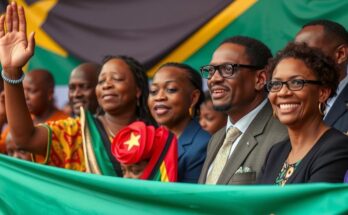Venezuelan comedians in exile are utilizing humor to critique authoritarianism, address migration experiences, and maintain cultural identity amid significant hardship. This rise in comedic expression reflects the struggles of the Venezuelan populace while fostering connections within a diaspora that has been driven by political and economic crises.
The plight of Venezuela has given rise to a unique phenomenon: comedians in exile who utilize humor to convey critiques of authoritarianism and to discuss shared experiences of migration and hardship. Estefanía León, a prominent figure in this movement, initially struggled with the tension between comedy and tragedy during Venezuela’s crisis. Residing in Caracas in 2017, she faced dire circumstances, with her father’s illness compounded by the national food shortage and soaring inflation. León fled to Mexico City in 2018, seeking refuge from political repression that threatened her freedom of expression through comedy. Since her migration, León has become a key player in a burgeoning Venezuelan comedy scene, largely developed outside her home country. She is involved with “El Cuartico,” a digital platform gaining significant traction online, boasting hundreds of thousands of followers and producing content that resonates with both Venezuelans and broader Spanish-speaking audiences. The comedic content has evolved to spotlight themes like migration and the intricacies of living under a dictatorship, elements often underrepresented in the contemporary comedy landscape. Other Venezuelan comedians, such as George Harris, José Rafael Guzmán, and Víctor Medina, have similarly relocated and embraced themes relevant to their own transitions and experiences, establishing a new comedic identity reflective of their exile and struggles. They perform in various countries, from the United States to Argentina, using humor not only as a coping mechanism but also as a tool for cultural expression. Even amid the political upheaval that characterizes today’s Venezuela, where comedians risk significant repercussions, those who remain, like Alejandra Otero, find ways to connect with their audience through humor, albeit with increasing caution. Otero’s work often navigates the realistic boundaries imposed by the current regime while expressing a desire for humor to remain a form of resistance. With the ongoing migration crisis, spanning nearly eight million Venezuelans since 2015, the diaspora has provided a fertile ground for a vibrant comedic culture that continues to evolve. Comedians are not just entertainers; they are now integral voices reflecting the struggles of their people and fostering connections through shared experiences of sorrow, resilience, and, ultimately, laughter.
The article discusses the resurgence of Venezuelan comedic voices in exile, particularly in the context of a catastrophic political and economic crisis that led to mass migration. With the Venezuelan government under Nicolás Maduro facing increased authoritarianism, many comedians found themselves struggling to navigate their craft within a climate of oppression. The piece highlights how these comedians have adapted their work to reflect their experiences of exile and the sociopolitical realities both within and outside of Venezuela. Not only do they rely on humor to cope with their circumstances, but they also utilize it as a medium for social critique and to reclaim their identities in a foreign landscape.
In summary, the movement of Venezuelan comedians into the international arena post-migration has produced a significant cultural response to both their experiences of exile and the socio-political turmoil in their homeland. While leveraging comedy to connect with broader audiences, this community also seeks to critique authoritarianism and articulate the challenges faced by millions of Venezuelans. The resilience of humor in these turbulent times underscores its importance as a tool for expression and unity among dispersed populations.
Original Source: www.nytimes.com




